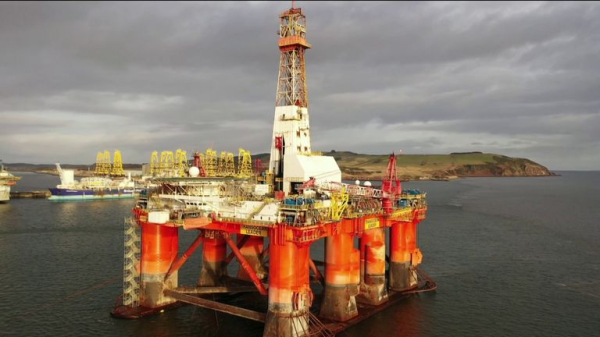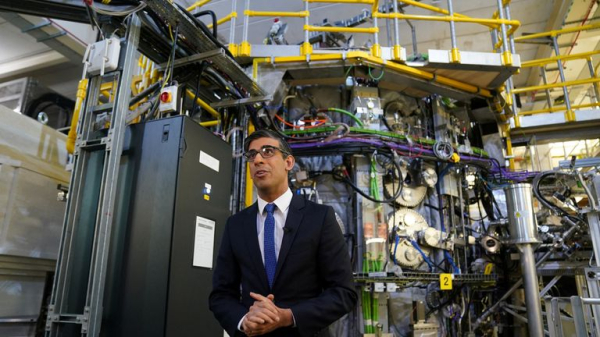Campaigners raise concerns over ‘cosy’ relationship between UK’s oil regulator and fossil fuel industry

Meeting notes have revealed how the UK’s independent oil and gas regulator is apparently helping the fossil fuel industry construct a new public “narrative” to “effectively make the case for continued North Sea oil and gas”.
The minutes were published on the website of the regulator, which is known as the North Sea Transition Authority (NSTA).
They detail the content of a North Sea Transition Steering group meeting on 9 May 2023 – a regular event currently co-chaired by NSTA chief Stuart Payne and Simon Roddy, who runs Shell UK’s North Sea business.
Executives from other fossil fuel companies and representatives from Offshore Energies UK, the industry lobby group, were also in attendance.
In a section headlined “Oil and Gas narrative” the minutes show that the group “would like to develop three to five key messages that are coherent and consistent, to effectively make the case for continued North Sea oil and gas”.
The group agrees on the need for “simple positive messages e.g, ‘In 2022 UK spent more on importing oil and gas than on Education’, ‘home grown is better'” and that “the industry needs to be more vocal and amplify the key messages”.
Those messages, according to the meeting notes, need “to be factual, defendable, and logical and industry needs to be aligned to these”.
Spreaker This content is provided by Spreaker, which may be using cookies and other technologies. To show you this content, we need your permission to use cookies. You can use the buttons below to amend your preferences to enable Spreaker cookies or to allow those cookies just once. You can change your settings at any time via the Privacy Options. Unfortunately we have been unable to verify if you have consented to Spreaker cookies. To view this content you can use the button below to allow Spreaker cookies for this session only. Enable Cookies Allow Cookies Once
Click to subscribe to ClimateCast with Tom Heap wherever you get your podcasts
According to its website, the purpose of the North Sea Transition Steering Group is to “discuss and review key strategic issues affecting the oil and gas industry”, which could arguably include public messaging.
But campaigners have told Sky News that the minutes are evidence of an inappropriately “cosy” relationship between the regulator and fossil fuel companies.
Executive director of campaign group Uplift, Tessa Khan, said: “It is the NSTA’s job to make unbiased, evidence-based decisions on whether or not to approve new oil and gas fields yet, astonishingly, we find it’s been colluding with industry lobbyists on how to best make the case for new drilling.

“How can the public be expected to trust its decisions if, at the same time, it’s helping oil and gas firms with their PR? The last thing the UK needs right now is yet more misleading spin on oil and gas.
“This casts doubt on how seriously the regulator is taking its role of helping the UK meet its climate obligations. The proposed Rosebank oil field, for example, is incompatible with the regulator’s own climate targets, but will the NSTA say ‘no’ to an industry it is clearly so cosy with?
“The UK urgently needs a regulator that is genuinely independent of the oil and gas industry.”
The government is pursuing a policy of expanding North Sea drilling while also ramping up the provision of clean energy and insists that its approach is compatible with the UK’s legally enshrined net zero goals.

‘Decarbonisation remains a priority for the industry’
A NSTA spokesperson defended what happened at the meeting, describing its role as a facilitator as opposed to anything more extensive.
They told Sky News: “The NSTA facilitates regular meetings where industry representatives discuss best practice which supports the UK’s energy security and its net zero goals. This is entirely appropriate and in keeping with our responsibilities and does not affect our independence, which we take extremely seriously.
“As made clear in the steering group minutes, which we routinely publish on our website, decarbonisation remains a priority for the industry. The NSTA is steadfastly holding the sector to account on emissions reduction, with impressive results. Emissions from UK North Sea production activities have fallen by more than a fifth since 2018, while flaring has been halved in the last four years.”

An Offshore Energies UK spokesperson described the meeting as much more of a collaboration.
They told Sky News: “The offshore energies industry, government and the regulator are committed to driving the success of the sector together, an approach called for in the 2014 Wood Review. Many sectors work collaboratively with governments and regulators through steering groups to drive action on key challenges and opportunities for the UK.”
A spokesperson for Shell told Sky News: “Continued production of North Sea oil and gas is vital to UK energy security and helps reduce its reliance on higher carbon and costlier energy imports. It is entirely consistent with a net zero pathway as modelled by the UK’s independent Climate Change Committee.
“After decades of supplying oil and gas, output from the UK North Sea is tailing off and now meets less than 50% of the UK’s demand. It is important to stop it tailing off too steeply, while the transition to low-carbon energy gathers pace.”
